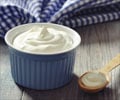A recent study shows how gut microbiota of 150 volunteers changed after a month of regular consumption of yogurt fortified with probiotics.

‘Increased production of bifidobacteria has a positive effect on the body's ability to resist inflammatory diseases, hormonal and cardiovascular diseases.’





In the new work, scientists applied sequencing of the microbial 16S rRNA gene to reveal how gut microbiota response to the regular consumption of dairy products with probiotics. It turned out that such diet increases the relative abundance of potentially beneficial bifidobacteria, which can help to metabolize lactose, produce vitamins and amino acids. These bacteria have a positive effect on the body’s ability to resist inflammatory diseases, hormonal and cardiovascular disorders. The study involved 150 healthy volunteers who consumed 125 milliliters of yogurt with probiotics in the morning and evening during thirty days. Gut microbiota metagenome was analyzed for each volunteer on the first day of the study and after 30 days. The analysis revealed changes in the ratio of different species of microbes. Depending on the baseline composition of the microbiota, the intensity of changes was different, but in any case they were positive.
"The microbiome of different people has individual characteristics, therefore, it responds to the diet differently. However, by analyzing the baseline state of the microbiome, we can predict how the microbiome will respond to the diet. This can be used to develop personalized nutrition schemes that will help improve the condition of a particular person," notes Alexander Tyakht, researcher at ITMO University.
Source-Eurekalert















